#indigenous latine
Text


Mari Wapichana with her Amazon Parrot friend🌿🌿🌿
#MariWapichana#Mari Wapichana#Roraima#Roraima tribe#Bird#green bird#amazon region#brown is beautiful#feathers#amazon women#native south American#Brazilian Indigenous#South American#Indigenous model#ndn women#indigenous latine#indigenous latina#bipoc#bipoc model#bipoc representation#poc women#poc models#face paint#animals#south american animals#animal friends#amazon parrot#parrot#parrots#wild parro
55 notes
·
View notes
Text
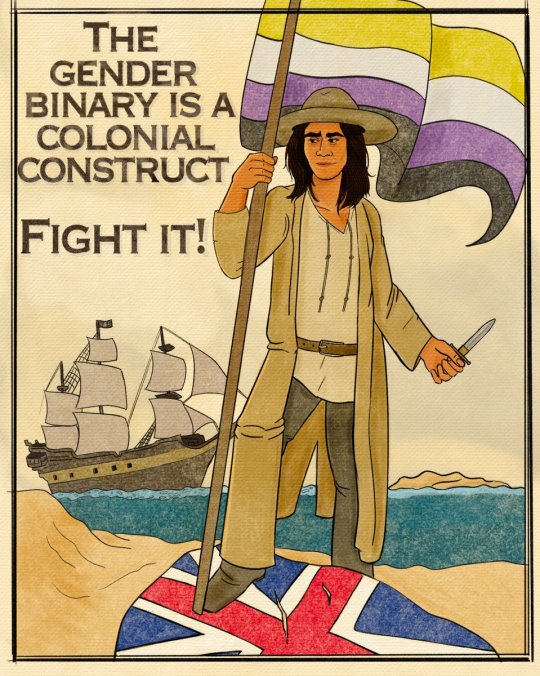
The anti-colonial power of Jim! What a gift to have a non-binary Latine rebel.
#ofmd#our flag means death#jim jimenez#jim#no for real#it speaks volumes a latine person#those decended from indigenous americans#gets to rebel against the colonial gender binary#vico i adore you#Jim my beloved#my art
2K notes
·
View notes
Text
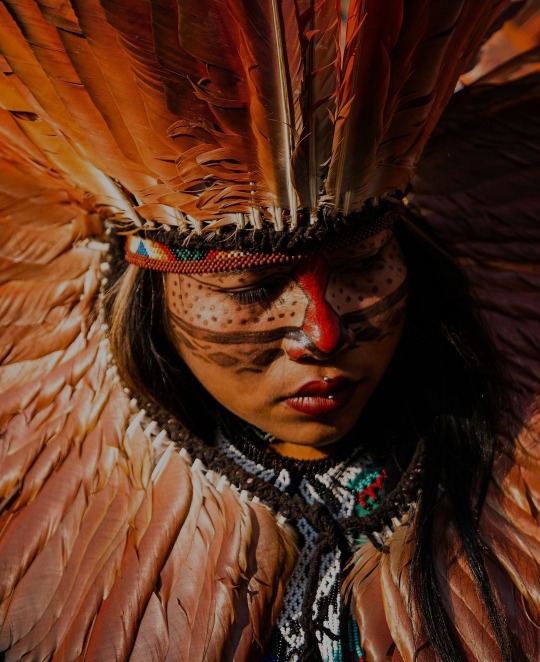
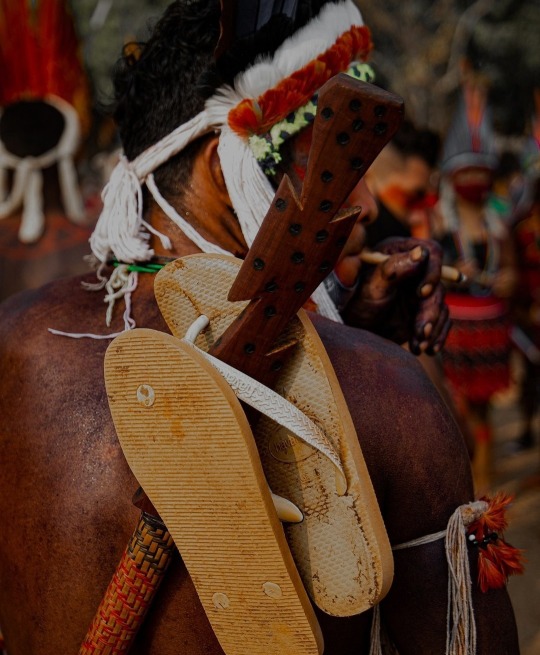
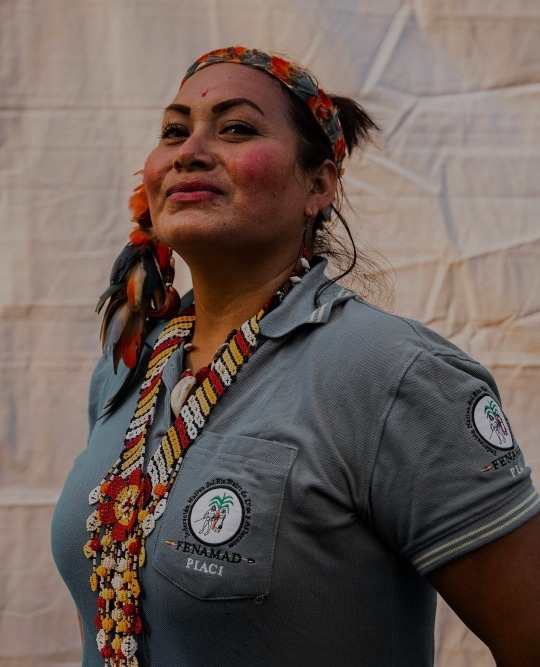

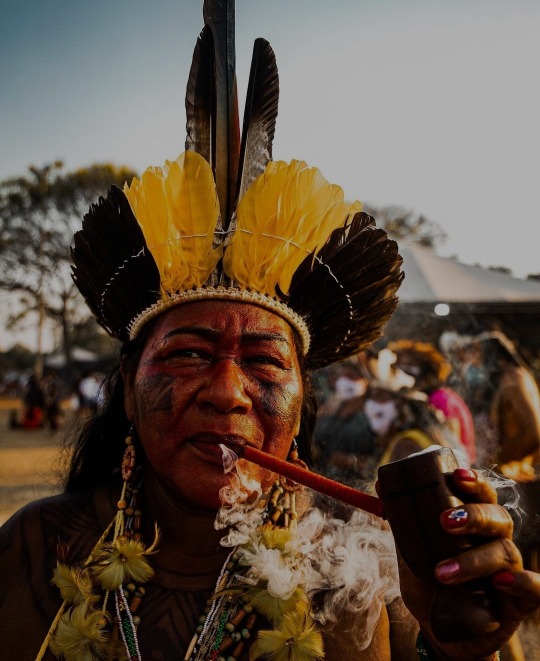
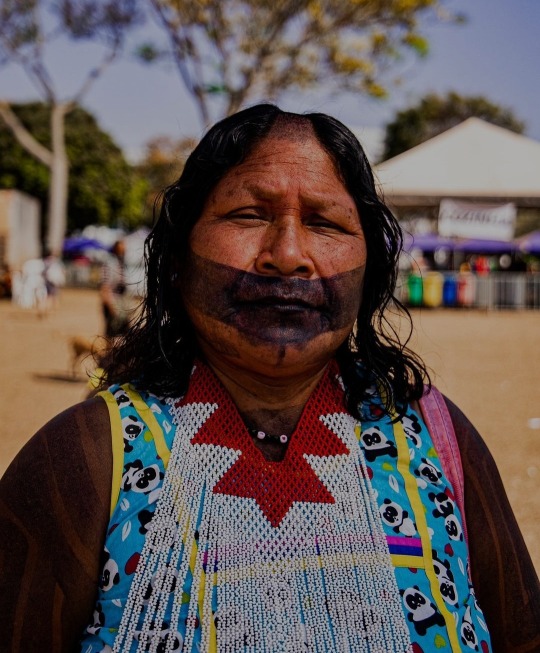


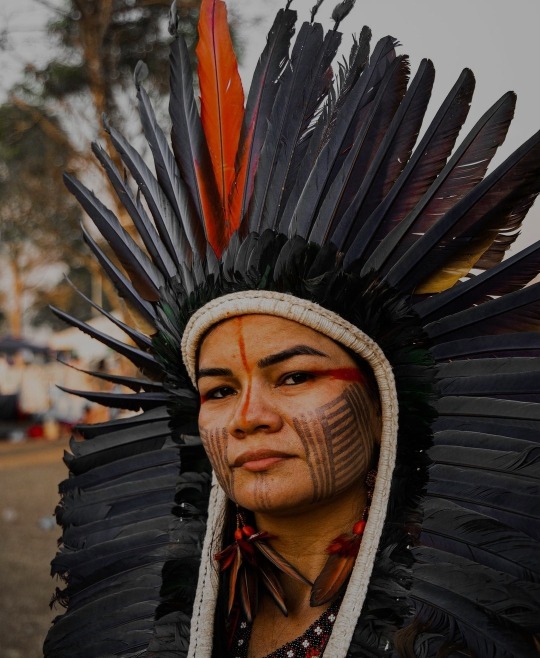

Marcha das Mulheres Indígenas, Brasília, 2021 🏹
#brasil#brazil#photography#women#indigenous issues#indigenous women#indigenous rights#indigenous people#indigenous#native women#native american#first nations#latin america#america latina#latinoamerica#meus posts
8K notes
·
View notes
Text
Breaking news from Panama! 🟢
In a historic vote, the nation’s highest court today ruled the Minera Panamá mining contract for an open-pit mine unconstitutional, marking a WIN for biodiversity, local communities, and our planet.
Panama has an opportunity now to be a leader in safeguarding precious ecosystems and protecting biodiversity. This ruling champions the rights, voices, and well-being of local communities over profit-driven interests.
This victory is also a beacon of hope for our planet’s future. Safeguarding irreplaceable ecosystems like these is critical to combatting climate change and biodiversity loss. Congratulations to the people of Panama, who overwhelmingly rejected profit over planet. We continue to stand with you!
Video credits:
Collaboration between @duletvindigena @waguafilms @mullu.tv & Passu Creative Community
Indigenous Protester - TV indígena and waguafilms
Great Green Macaw - Hans Norelius, CC BY 2.0
Gemini's Dart Frog Jaime Culebras / @photowildlifetours
#PanamaTeQuieroVerde
#PanamáValeMásSinMinería
#panama#central america#latin america#abya yala#environmental justice#climate justice#ecology#anti imperialism#extractivism#neocolonialism#anti colonialism#indigenous rights#degrowth#i'm so happy for my country 😭❤️
522 notes
·
View notes
Text
25 YA Books for Indigenous Peoples Day

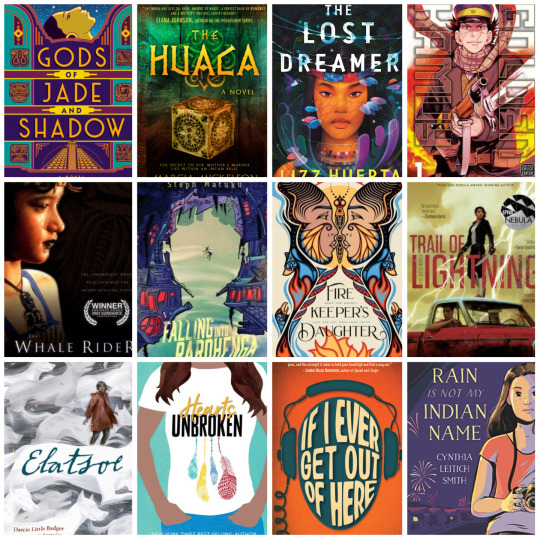
NOTES: For brevity and diversity, I did not include all the North American Native books I found, but there are plenty more - feel free to post your favorites in the comments! Most books are from indigenous authors, but not all - do your own research if you like. Not all books may be “technically” YA. I’d love to hear more suggestions of Latin American indigenous stories or Hawai’ian native stories which were difficult to find.
EDIT: This is just a random list by a random tumblr blog from 2022 - get out there and find your own books or list some in the comments if you find this list lacking.
Australia
The Things She's Seen by Amebelin & Ezekiel Kwaymullina
The Boy from the Mish by Gary Lonesborough
Becoming Kirrali Lewis by Jane Harrison
Swallow the Air by Tara June Winch
Canada
The Missing by Melanie Florence
Sorrow's Knot by Erin Bow
Son of a Trickster by Eden Robinson
The Marrow Thieves by Cherie Dimaline
A Girl Called Echo by Katherena Vermette
Surviving the City by Tasha Spillett
Japan - Ainu
Golden Kamuy by Satoru Noda
Latin America
Saints of the Household by Ari Tison
Tree Girl by Ben Mikaelsen
The Huaca by Marcia Argueta Mickelson
Gods of Jade and Shadow by Silvia Moreno-Garcia
The Lost Dreamer by Lizz Huerta
New Zealand - Maori
The Whale Rider, Witi Ihimaera
Falling into Rarohenga by Steph Matuku
United States
Firekeeper's Daughter by Angeline Boulley
Trail of Lighting by Rebecca Roanhorse
Elatsoe by Darcie Little Badger
The Absolutely True Diary of a Part-Time Indian by Sherman Alexie
If I Ever Get Out of Here by Eric Gansworth
Hearts Unbroken by Cynthia Leitich Smith
Rain is Not My Indian Name by Cynthia Leitich Smith
#indigenous peoples day#indigenous#book list#fuck columbus#native american#first nations#diverse ya#diversity in media#diverse books#aboriginal#maori#latin america#north america#south america#australia#canada#japan#new zealand#united states
2K notes
·
View notes
Text
"When President Lula da Silva took office this year in Brazil, many environmental and indigenous rights groups hoped he would fulfill campaign promises of better protection for the Amazon rainforest and the people who live there.
Nearly four months into his tenure and early signs are that Lula was telling the truth, as Brazilian police have evicted dozens of illegal gold miners from the Yanomami Reserve, an area the size of Portugal inhabited by around 35,000 [Indigenous people].
Illegally-mined gold accounts for around half of all the country’s exports, and a new Environment of the Amazon division of the federal police is seeking international assistance in building a first-rate structure for targeting the outside funding toward and sales from illegal gold mining.
Reuters says that so far, the new division has ousted nearly all miners from the area, including overseeing the destruction of 250 mining camps and 70 low-tech boats used for dredging. 48 planes and helicopters for smuggling the gold out of the reserve have been seized as well.
The police hope to use radioisotope technology and methods to be able to pinpoint the exact mineralogical makeup of illegally mined gold as a way of targeting it in the market even after it’s melted into ingots.
They also plan to remove miners from 6 other Amazon reserves this year, while setting up a permanent, floating police station on a river in the Yanomami Reserve.
At the moment, the Lula Administration is considering the best set of laws for tackling the problem. While 804 miners have been arrested in the raids, all were let go, and many others fled in the police advance.
Humberto Freire, from the new Amazon division, told Reuters he and his department hope to create a sophisticated electronic tax receipt for any transactions of precious metals to help pinpoint sales and distribution of suspected illegal bullion."
-via Good News Network, 3/23/23
youtube
-video via Reuters, 3/22/23
#lula da silva#amazon#amazon rainforest#rainforest#conservation#indigenous peoples#indigenous activism#illegal mining#gold mining#brazil#south america#yanomami#environmental justice#amazonia#latin america#conservation news#good news#hope#Youtube
458 notes
·
View notes
Text

El Luchador De Amor
A mockup book cover, cause I want to get paid to do romance book covers. I wanted to show what it would look like 🥺💕
I'm all about T4T art and making everything Mexican and gay so here you go 😏🏳️⚧️🤠
#trans masc#T4T#trans4trans#trans latino#trans latine#mexican artist#indigenous artist#seattle artist#commissions open#illustrator#illustrator for hire#yaillustrator#gnillustrator#Luchador#transartist#latineart#latinevoices#trans art
229 notes
·
View notes
Text
does anyone have reading recommendations that clarify the difference between liberalism and fascism? I’m having trouble distinguishing what is just like normal levels of imperial/colonial violence conducted by a liberal state and what pushes it over the edge into a fascist state. Is fascism simply mature liberalism? Is it liberalism in crisis? Can we only make historical, reactive judgements about what is fascist, which is to say, can we only know if fascism occurred after it has come and gone? I take the general point that calling all liberal states fascist can let them off the hook for types of violence considered normal or “just doing business,” invisibilising the daily violences they conduct as part of the regular maintenance of a liberal capitalist state. People are calling the US fascist for its direct participation in and funding of the genocide in Palestine - a diagnosis I don't disagree with, but if that’s the case, where do you draw the distinction between the US being merely a liberal state with aggressive global imperial ambitions and the US being a fully fascist state? Perhaps more bluntly, what’s the difference between a liberal drone strike and a fascist one? I’m struggling to understand the value of the fascist label, because everything it describes (ultranationalism, a theory of racial and cultural degeneracy/decline, paranoia about an imminent external threat expressed as violence against internal populations deemed to have insufficient loyalty to the country, a turn towards a mythologised tradition of the past, imperial expansion, genocidal projects against minority populations, etc etc) just seems to me like a description of United States in general lol
#if we call all liberal states fascist we risk exceptionalising liberalism <- point I am sympathetic to#but if that’s the case then like what does the fascist label get us? What does it ‘do’ as analytical tool? How does it help us understand#the world today and the history of the world?#was the iraq war fascist? If so are we meant to understand that the US stopped being fascist for a couple years#and is now fascist again? Despite the continued occupation & violence & sanctions in Iraq Libya Yemen Afghanistan etc during that time ?#are all the coups it did in Latin America fascist or just normal liberal behaviour? Was the Korean War fascist? The Vietnam war?#what about the Cold War? What about the genocide of indigenous people in North America? What about chattel slavery?#I guess I’m just at like a point in my knowledge of history that none of the governments or movements or actuons called fascist#seem even remotely different from just like regular imperial and colonial violence#and so like my current inclination is that either all of this is liberal or all of this is fascist#and that doesn’t feel satisfactory lol
87 notes
·
View notes
Text
Imposter Syndrome as a native person is very real, especially if you're reconnecting or white-presenting.
Whenever pretendians with large platforms built on their "heritage" are outed as liars, it can affect actual natives mental health - which is why pretendians are such a huge issue.
To all natives with Imposter Syndrome, it's hard but you know your heritage and who you are - don't let liars take that away from you, especially when they want to be you.
#woc#woc experience#latina#latine#poc#latino#imazighen#indigenous#native#pretendians#imposter syndrome#reconnection#white presenting poc#white passing poc#when i was early in my reconnection journey i often had imposter syndrome surrounding my heritage#and i often still do when people who have faked their heritage for years are outed#i know my heritage - im accepted by my local community & tribe#i know my family and yet it still can affect me sometimes#and i think it's important that as an indigenous woman who's been through it - to tell other indigenous ppl who are less secure in their#heritage that we do experience imposter syndrome and that pretendians do impact our collective mental health#i owe it to my indigenous brothers and sisters to let them know that they are not alone in experiencing this#and remember most pretendians don't experience imposter syndrome around their fake heritage because they don't care enough to
93 notes
·
View notes
Photo
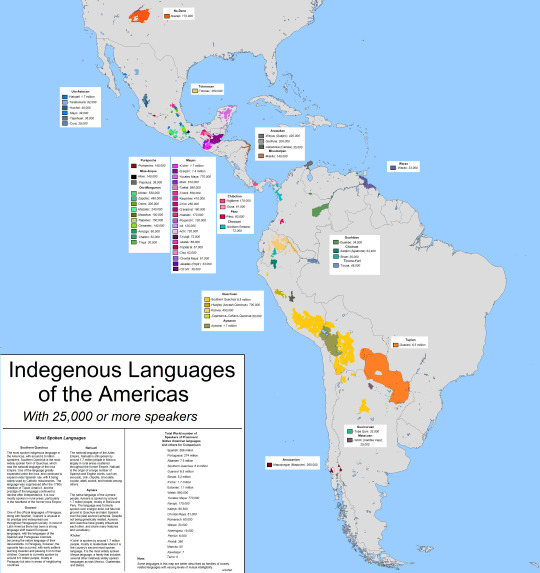
Indigenous Languages of a Latin America with more than 25,000 speakers.
by u/Aofen
204 notes
·
View notes
Text
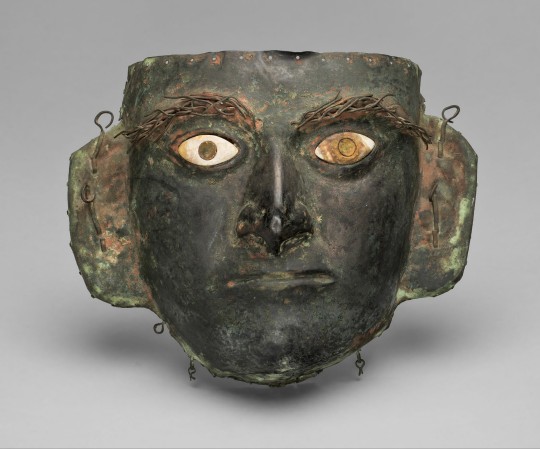
~ Mask
Culture: Moche
Date: 100 B.C.–A.D. 500
Medium: Copper, shell, and pyrite
#ancient#ancient art#history#museum#archeology#ancient sculpture#ancient history#archaeology#moche#peruvian#peru#south america#latin america#indigenous#mask#100 b.c#a.d. 500
721 notes
·
View notes
Text
In all honesty…white readers suck. Readers control a lot. Us spreading the word about our favorite books or authors helps a lot. That’s how authors and books win awards and get on best sellers lists. Y’all do not give that energy to nonwhite authors though. You going “Well I don’t have to” and “They don’t make interesting books” or any variations of those two when you’re told to diversify your bookshelves is not only racist, but a bold faced lie. There are amazing stories being told by BIPOC authors in every genre but all cuz you “can’t relate” you absolutely refuse to buy their books or give them a chance. And before anyone gets offended, of course it isn’t all white readers. However, it is too many of y’all. That’s exactly why y’all are reacting to Leah being casted as Annabeth the way you are. You’re racist. No amount of “Well she’s not blonde” or “she doesn’t have grey eyes” is ever going to explain why you think that little girl isn’t good enough. It’s all just veiled racism. Excuses. Very bad and horribly disguised excuses. You do the same thing with BIPOC authors. You sit there and complain, email authors your horrible and ignorant comparisons, and are absolutely disrespectful to the cultures and people these stories surround. I mean it’s not surprising since a lot of you do it in real life as well.
#white readers#white people#black authors#latine authors#indigenous authors#native authors#asian authors#representation in books#i said what i said#unique writes
1K notes
·
View notes
Text

Half Indian/Half Mexican, James Luna, 1991
#photography#vintage photography#vintage#black and white photography#james luna#1990s#1991#portrait#mexican#latin american art#american indians#indigenous art#indigenous#puyukitchum#kumeyaay
42 notes
·
View notes
Text
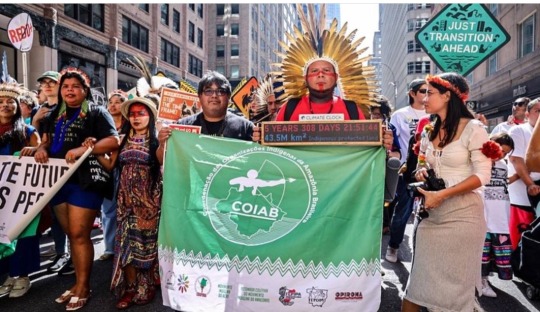
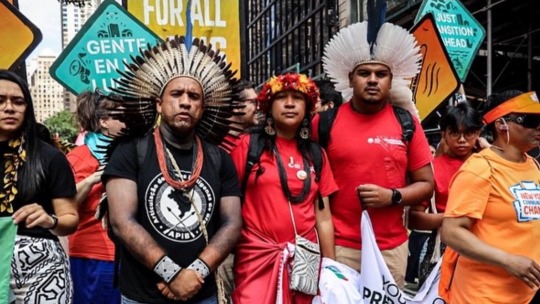
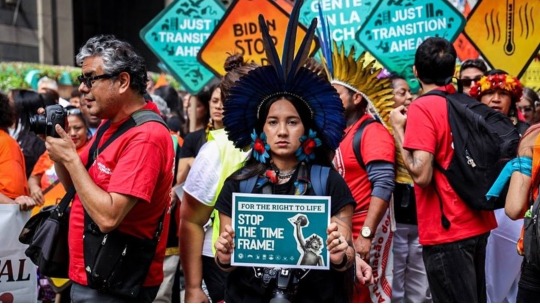
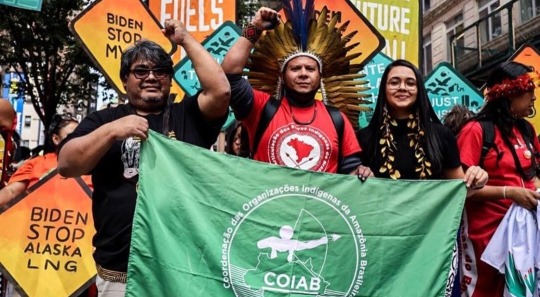
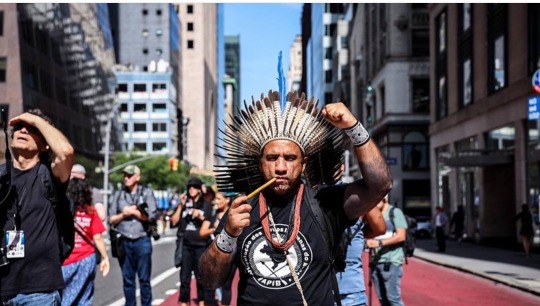
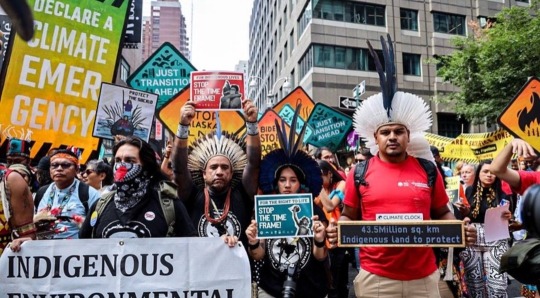
"Trial scheduled for September 20th at the Supreme Federal Court may determine the future of Indigenous Lands in Brazilian territory and be crucial for the global climate. The indigenous movement is mobilizing across Brazil, and an indigenous delegation from Apib is in New York during Climate Week to strengthen the international mobilization campaign in defense of Indigenous Lands rights."
"We are on the land, and the land is within us. If the land dies, we as indigenous peoples die."
The Articulação dos Povos Indígenas do Brasil (Articulation of Indigenous Peoples of Brazil — APIB) is calling for nationwide mobilizations this week and participating in the New York Climate Week to alert the world to the risks of the Supreme Federal Court (STF) judgment scheduled for September 20th. The court will vote on the legitimacy of the legal concept known as the "Temporal Framework," advocated by the Brazilian agribusiness, which could reevaluate Indigenous Land demarcations and impact global climate crisis mitigation efforts.
The Temporal Framework suggests that only indigenous people who can prove they were living on the land in 1988, the same year the Federal Constitution was created, should have rights to the land. This disregards the forced displacements of hundreds of indigenous groups who could only reclaim their traditional lands after Brazil's redemocratization in the late 1980s.
This week, the 15th edition of Climate Week is taking place in New York from September 17th to 24th, alongside the 78th Session of the United Nations General Assembly from September 19th to 23rd, which will feature a speech by President Lula during its opening. A delegation of 10 indigenous leaders is in New York to participate in Climate Week's activities. The international mobilization's goal is to emphasize to the world that the Temporal Framework is a threat to the lives of Brazil's indigenous peoples and could exacerbate the climate crisis, as Indigenous Lands serve as a reservoir of life on the planet.
Apib and its regional organizations are reinforcing mobilizations in territories, cities, and Brasília against the Temporal Framework on September 20th. The goal is to monitor the trial and strengthen the next steps of the indigenous movement's fight. The organizations within Apib mobilized over 220 protests in 21 states, including the Federal District, between May and June.
Five Supreme Federal Court (STF) justices are yet to vote in the trial. The current tally stands at four votes against the Temporal Framework thesis and two in favor. Justices Edson Fachin, Alexandre de Moraes, Cristiano Zanin, and Luís Roberto Barroso have expressed opposition to the agribusiness-backed thesis, while the only favorable votes came from justices appointed by former President Jair Bolsonaro, André Mendonça, and Nunes Marques.
On the same day as the STF vote, the Brazilian Senate attempts to put the Temporal Framework into law. The ruralist caucus in Congress seeks to create tension with the Brazilian judiciary since there is a possibility that the STF may invalidate the Temporal Framework thesis.
In addition to the Temporal Framework, Bill 2903 proposes other setbacks to the rights of indigenous peoples, such as the construction of highways and hydroelectric plants in indigenous territories without free, prior, and informed consent from affected communities. The proposal also aims to allow farmers to enter production contracts with indigenous people, violating the rights of indigenous peoples to the exclusive use of demarcated territories.
While some falsely claim that "there is too much land for too few indigenous people in Brazil," Apib counters that there is too much land for too few farmers and that agribusiness promotes the illegal invasion of indigenous lands. The entity asserts,
"There is no solution to the climate crisis without guaranteeing the rights of indigenous peoples and the demarcation of their territories."
Currently, nearly half of Brazil's land is in the hands of rural producers. Of the total land in the country, 41% corresponds to rural properties, 13.7% to indigenous lands, and 45.2% to other purposes, according to data published in the Official Gazette of the Union. Indigenous Lands are a guarantee of life for indigenous peoples and for all of humanity, which depends on the climate's future.
"As worsening climate crisis unfolds, many will be marked in history as accomplices to the new colonialism threatening the survival of us, indigenous peoples who inhabit the vast territory known as Brazil, and the future of all humanity because there is no solution to the climate crisis without the involvement of indigenous peoples," emphasizes Dinamam Tuxá.
Key activities of Apib during the 15th edition of Climate Week from September 17th to 24th:
On September 17th, Apib participated in the Climate Week march through the streets of New York in support of the Fight Fossil Fuel Strike. The indigenous delegation from Apib denounced the threat posed by the Temporal Framework thesis, highlighted the indigenous emergency situation concerning extractive industries and agribusiness that lead to multiple instances of violence in our territories. Additionally, as part of the Climate Week agenda, it's worth noting that Apib's executive coordinators Kleber Karipuna, Dinamam Tuxá, and other members of the indigenous delegation will participate in a talk on September 19th titled "FCLP: Rights, Participation, and Benefits for Indigenous Peoples and Local Communities in Forest Climate Financing," organized by the Forest and Climate Leaders Partnership. On September 22nd, a portion of the delegation will be present at a dialogue co-organized with H.E Razan Al Mubarak, the current president of the International Union for Conservation of Nature, to assess progress in the COP28 agenda with the aim of collectively identifying meaningful and respectful ways for Indigenous Peoples to engage in the COP.
About APIB
The Articulation of Indigenous Peoples of Brazil (Apib) is a nationally recognized entity within the indigenous movement in Brazil, created from the grassroots up. It brings together seven regional indigenous organizations (Apoinme, ArpinSudeste, ArpinSul, Aty Guasu, Conselho Terena, Coaib, and Comissão Guarani Yvyrupa) and was founded with the purpose of strengthening the unity of our peoples, fostering coordination among different regions and indigenous organizations across the country, as well as mobilizing indigenous peoples and organizations against threats and infringements on indigenous rights.
Support/donate to APIB
APIB Instagram page
APIB Website
#yara.txt#brasil#brazil#latin america#america latina#south america#brazilian politics#brazilian indigenous people#indigenous people#indigenous#native american#native women#first nations#ndn#ndn tag#ndn tumblr#latinoamerica#environmentalism#climate crisis#climate emergency#nature#naturism#naturist#anti capitalism#capitalism#anti colonialism#anti colonization#colonialism#colonization#neocolonialism
182 notes
·
View notes
Text
The people of Panama are coming together to defend nature, calling on the country’s Supreme Court to declare a controversial mining project – in the protected rainforest Bosque Donoso – as unconstitutional.
This area, lying in the heart of the largest biological corridor in Mesoamerica, is a lifeline for many migratory species. It is critical to the livelihoods and cultures of local and Indigenous communities, and is home to wildlife that includes macaws, tapirs, monkeys and jaguars. This mining activity would have destructive impacts on the surrounding ecosystems, species, and people.
A global spotlight can help Panamanians win a critical victory for biodiversity and can pave the way for a more sustainable future.
Sign the petition to halt the mining project in Panama at this link: https://chng.it/dMzbJSxv7v
#PanamaTeQuieroVerde #PanamáValeMásSinMinería
Video credits:
Collaboration between @duletvindigena @waguafilms @mullu.tv & Passu Creative Community
Narrated by @rosedelizg
Cover photo by @enlayesk507
#panama#central america#latin america#abya yala#environmental justice#climate justice#ecology#anti imperialism#extractivism#neocolonialism#anti colonialism#indigenous rights#signal boost
252 notes
·
View notes
Text
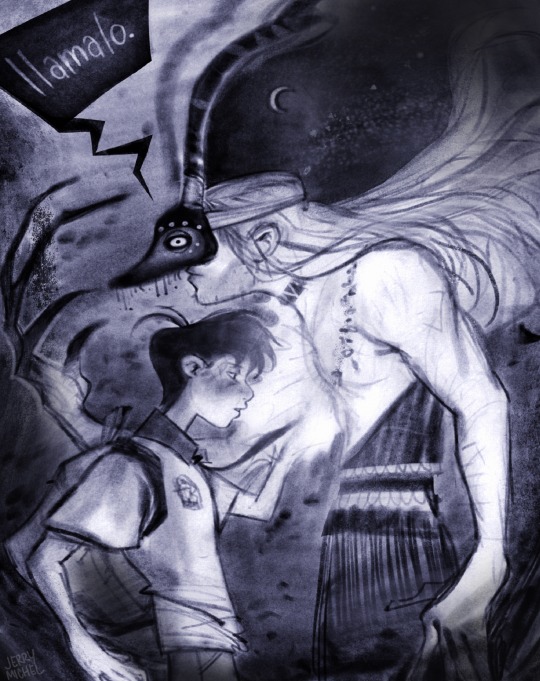
Our Share of Night, Mariana Enriquez
#been loving this book#our share of night#my art <3#my fanart#nuestra parte de noche#mariana enriquez#horror art#scary art#spooky art#macabre#latin america#argentina#indigenous art#indigenous artists#illustration#book fanart#booklr#horror fiction#gothic#gothic art#darkart#magical realism#latinx artist#latine artist#literature#illustrator#the dangers of smoking in bed#things we lost in the fire#los peligros de fumar en cama#las cosas que perdimos en el fuego
125 notes
·
View notes